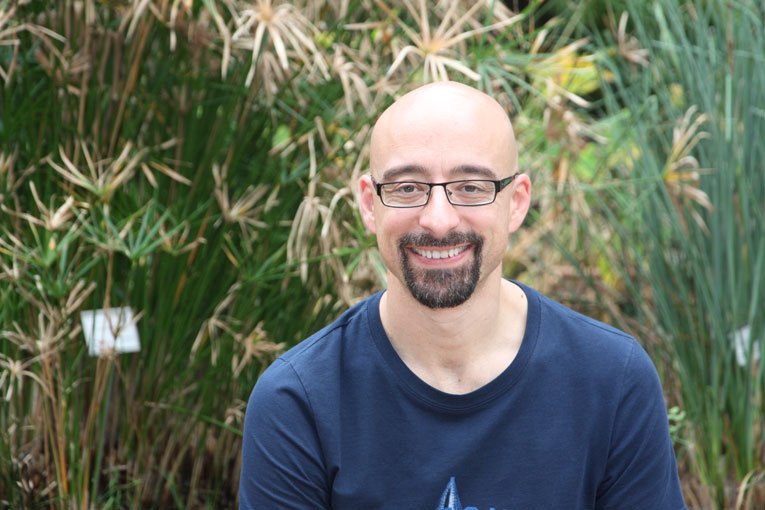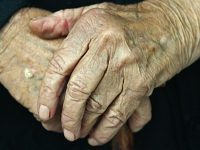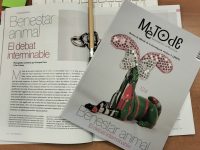
 Lucía Sapiña Lucía Sapiña |
||
|
Researcher, PhD in Medicine, professor of Biochemistry at the University of Leicester, novelist, communicator, musician… One may ask how he gets the time for everything. However, the question vanishes when Salvador Macip starts talking. His speech flows agile, vertiginous, ever so full of content. He delivers figures, quotes research, laughs, gesticulates… If he types as fast as he talks and thinks, his ability to produce content can be fully justified. Salvador Macip just received, along with Chris Willmott –professor of biochemistry in the same university–, the XIX European Award for Science Communication (University of Valencia, General Studies) for the book Jugar a ser déus (Playing God), devoted to bioethics. Why did you choose bioethics as the theme for the new book? What topics were more difficult to address when writing the book? |
«Polemic issues such as prenatal diagnosis and others pose very important ethical reservations, and each one must assess them according to his or her own moral code» |
|
|
|
«Having a cancer in the future should be like having diabetes» |
|
| You say we should not be afraid of cancer but, at the same time, you claim one in three people will suffer one during their life. This piece of data created some dispute during the presentation of Mètode’s issue devoted to cancer, and a voice among the audience admitted the chances were terrifying. Of course, but mainly because cancer is still linked to death in our minds. If you say a third of the population will suffer a cancer you are immediately thinking a third of the population will die of cancer. We can cure 50% of cancers now. So having a cancer in the future would be like having diabetes. A long time ago it was fatal because we did not have insulin, but today we managed to turn it into a disease like AIDS, which was deadly thirty years ago and now, although it is still a terrible disease, we can control it. Cancer is not yet at this point, but we are walking towards it. The problem is not, therefore, how many people have cancer but how many people die of cancer. It is important to separate these two things: not to link cancer and death automatically. The fact that cancer is associated to something you cannot avoid makes us neglect prevention, and there lies the greater risk. Obviously, there is a random factor to it, but another part can be controlled and I wanted people to be clear on that. When the media say that half of the cancers are cured, should we specify the type of cancer so we do not create false hope? Cancer is many diseases, there is a lot of variation. I think with this 50%, it is even more positive to think of the most frequent types of cancer, such as breast cancer, with 80% survival rate today. So it is not just 50%, but way over that, in the most frequent types. These encouraging numbers are for the most curable cancers. Which are the ones with the worst prognosis? The cancers we can detect earlier are the ones with better prognosis. When a cancer has no symptoms until it is very advanced, as pancreatic cancer does, the chance of recovery is lower. Skin cancers, for instance, are among the ones with better prognosis –even aggressive melanoma– because we can see them. But the most concealed ones, like lung cancer, are more difficult to find. And it will be like that until we find some kind of marker or alarm that goes on when the cancer starts developing. Are some people more protected against cancer? Yes, there are. Obviously, there is a genetic part we do not know and has an effect. Small variations in the genes of the protein genes that control cancer make a big difference. One of the fears of cancer is the fact that a lot of factors intervene. You can control some, but not genetics, nor the misfortune that the mutation occurs in a certain gene. Today, with genetic tools and massive sequencing of tumours and regular genes, we are slowly discovering what genes are involved in this predisposition. With the current importance of genetics, are we not running the risk of «genetisizing» cancer, giving more importance to genetics than environmental factors? Indeed. And that would be a big mistake. 90% are environmental, while genes determine 10%. The important thing is, above all, to act on what we can change. If you are told you have a higher risk, it should not make a huge difference. Everyone should prevent cancer the same way. It should never be like: «oh, I have a higher risk of cancer, so I won’t smoke». No, nobody should smoke. Even if you are not a higher-risk patient, but tempt your luck, you have more chances of having cancer. Every factor adds up, but a predisposition is not predestination and you should not be afraid, because there are other environmental factors. Attitudes that prevent cancer are quite acceptable. Why is it so difficult to follow them? That is a good question. Why is it so difficult? I do not know… With diseases like cancer, the ignorance of the current situation may be the basis for this idea that no matter what I do, I will have cancer. There is always someone in the family who smoked and drank and was ok. Of course, if you have the same combination of genes and luck as that person, that is fantastic, but it is much more reasonable to try to control and avoid harmful things…
|
|
|
 Lucía Sapiña Lucía Sapiña |
«The Internet is a great tool for education, but it is also a great way to spread false information» |
|
| Are there still many myths about cancer? Yes. Mainly concerning treatment. For instance, all the talk about the drug the pharmaceutical industry does not want to create… There are a lot of myths like that one… The Internet is a great tool for education, but it is also a great way to spread false information. To a considerable extent, people take scientifically wrong ideas, seen in laboratory work but not yet researched enough, and they sell them as a solution for cancer. The problem is we scientists are still researching in that regard… Part of the blame is on us because when we make a discovery we have the pressure of our peers, the university, the pressure of having to explain it, and any breakthrough we make concerning cancer is great, and you go to the newspaper and anyone may think you discovered the cure for cancer every week. In addition, people are always in a hurry. When you have a cancer, you do not accept that we will have an answer in ten years. I understand people will try anything but that allows some alternative characters to make an incredible business that is based in scientific principles but it is not proven to work at all. And how can we avoid that? Because it seems that the responsibility is shared: scientists, the media… I agree. How can we fight that? My work is my two cents, go out and explain what we do in the lab, and I think scientists need more of that kind of thing: to be able to communicate what we do. Trust not only the filter of the media, because journalists do their best, but they also have their limitations; trust not only your university press service; try not to be mesmerized by the glory of being in the newspaper pages, but explain every little piece of your work… I think science communication in this century needs to follow this path: people who really have adequate information have to find a way to bring it to the directly to the audience. You are a good example. Do you think the journalist lost its role as intermediary? Lucía Sapiña. The Two Cultures Observatory. Mètode journal, University of Valencia. |
«The mistake of scientists is not to try to involve themselves in popularization» |
|

 Lucía Sapiña
Lucía Sapiña Lucía Sapiña
Lucía Sapiña



